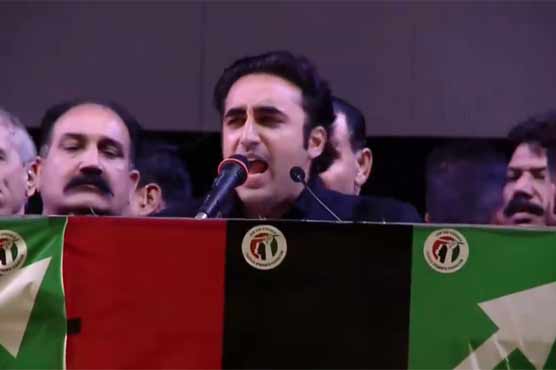Benazir Bhutto struggled for the rights of people for 30 years: Bilawal

Bilawal said Benazir Bhutto had fought two dictators during her lifetime.
RAWALPINDI (Dunya News) – Pakistan Peoples’ Party (PPP) chairman Bilawal Bhutto Zardari on Friday said that martyred former prime minister Benazir Bhutto struggled for the rights of general public for 30 years.
Addressing a public gathering on the occasion of death anniversary of former prime minister Benazir Bhutto at Liaquat Bagh in Rawalpindi on Friday, he said that Rawalpindi witnessed how the peoples leader was treated, adding that martyred Bhutto gave rights to the labourers.
Bilawal said that his grandfather Zulfikar Ali Bhutto gave rights to labourers when he was prime minister and his mother Benazir had fought two dictators during her lifetime.
The PPP chairman went on to say that Benazir Bhuto provided Pakistan with the much-needed missile technology. "The country is being ruled by ‘political orphans ," he said and added today, media is under siege and judiciary is under attack.
He said: "People are protesting against the inflation and joblessness, adding that the economy is on the brink of destruction and the government has excluded over 0.8 million people from the BISP programme which is a grave cruelty.
Benazir Bhutto
Benazir Bhutto was born on June 21, 1953, in Karachi, Pakistan, the eldest child of former premier Zulfikar Ali Bhutto. She went on to found the Pakistan People s Party and serve as the nation s prime minister (from 1971 to 1977). After completing her early education in Pakistan, she pursued her higher education in the United States.
Benazir Bhutto became the first female prime minister of Pakistan in 1988. She was killed by a suicide bomber in 2007.
She inherited leadership of the PPP after a military coup overthrew her father s government and won election in 1988, becoming the first female prime minister of a Muslim nation. In 2007, she returned to Pakistan after an extended exile, but, tragically, was killed in a suicide attack.
Bhutto returned to Pakistan in 1977 and was placed under house arrest after General Mohammad Ziaul Haq overthrew her father s government. One year after Ziaul Haq became president in 1978, the elder Bhutto was hanged after his conviction on charges of authorizing the murder of an opponent. She inherited her father s leadership of the PPP.
There was more family tragedy in 1980 when Bhutto s brother Shahnawaz was killed in his apartment on the Riviera in 1980. The family insisted he was poisoned, but no charges were brought. Another brother, Murtaza, died in 1996 (while his sister was in power) in a gun battle with police in Karachi.
She moved to England in 1984, becoming the joint leader in exile of the PPP, then returned to Pakistan on April 10, 1986, to launch a nationwide campaign for open elections. She married Asif Ali Zardari, in Karachi on December 18, 1987. The couple had three children: son Bilawal and two daughters, Bakhtawar and Aseefa.
While in self-imposed exile in Britain and Dubai, she was convicted in 1999 of corruption and sentenced to three years in prison. She continued to direct her party from abroad, being re-affirmed as PPP leader in 2002.
Bhutto returned to Pakistan on October 18, 2007, after President Musharraf granted her amnesty on all corruption charges, opening the way for her return as well as a possible power-sharing agreement.
Tragically, Bhutto s homecoming rally after eight years in exile was hit by a suicide attack, which killed 136 people. She only survived after ducking down at the moment of impact behind her armored vehicle. Bhutto said it was Pakistan s "blackest day" when Musharraf imposed a state of emergency on November 3, 2007, and threatened to bring her supporters on to the streets in mass demonstrations. Bhutto was placed under house arrest soon after, on November 9, and she called for Musharraf s resignation four days later. The state of emergency was lifted in December 2007.
Bhutto was killed when an assassin fired shots and then blew himself up after an election campaign rally in Rawalpindi on December 27, 2007. The attack also killed 28 others and wounded at least another 100. The attacker struck just minutes after Bhutto addressed a rally of thousands of supporters in the garrison city of Rawalpindi, eight miles south of Islamabad. She died after hitting her head on part of her vehicle s sunroof—not as a result of bullets or shrapnel, a spokesman for Pakistan s Interior Ministry said. President Musharraf said that he had asked a team of investigators from Britain s Scotland Yard to assist in the investigation into Bhutto s killing.
Hundreds of thousands of mourners paid last respects to former Pakistani Prime Minister Bhutto on December 28, 2007, as she was buried at her family s mausoleum in Garhi Khuda Bakhsh, the southern province of Sindh. She was buried alongside her father Zulfikar Ali Bhutto, Pakistan s first popularly elected prime minister who was executed by hanging. Bhutto s husband, Asif Ali Zardari, her three children and her sister, Sanam, attended the burial. Following Bhutto s death, Pakistani President Pervez Musharraf announced three days of mourning.

